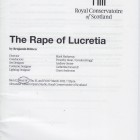Rape of Lucretia 2012Royal Conservatoire of Scotland
Read more about the opera Rape of Lucretia
Benjamin Britten's highly dramatic early work seems to have regained popularity in recent years - in the decades after its composition it became very unfashionable, suffering trenchant criticism, particularly of Ronald Duncan's libretto. However it has been shown to work highly effectively even in big spaces (ENO have presented two productions at the Coliseum). It has become a very popular work for student performers needing to sharpen their acting skills.
On this occasion the Conservatoire managed to assemble two casts which were remarkable for a consistently professional standard. No allowances needed to be made for the inexperience of the actors, and a fascinating opportunity arose to observe the changes of nuance between the performances. Mark Hathaway's lucid and highly dramatic staging was helped greatly by the sensible decision to use the excellent platform set created for Scottish Opera's 5:15 programme. With a large acting area at front and a smaller raised one at the rear, linked by two curved stairs at the sides, there was ample room for the band in the central space and the whole had an ideal sense of intimacy which should serve for many productions in future years, both for modern and baroque works.
As has become the custom, the Chorus singers took more involvement in the action than in the old days, and the overt Christian overlay of the work was reduced. They wore discreet modern casuals, while the Romans were tactfully costumed in what could represent an ancient style. The officers' uniforms allowed for great freedom of movement, and they were all required to throw themselves about the stage very effectively in the opening scene - something all five actors achieved with notable ease.
Three singers appeared very effectively in all performances, having no problems adapting to two conductors and casts whose readings varied at times. Of the two Lucretias, the first was a mature contralto, the second a lighter voiced, more obviously vulnerable character - equally valid. As Tarquinius, the two baritones were superbly three-dimensional, not just cardboard villains. The first was subtle, already half a tyrant, the second less tall, more cocky in attitude but also more vulnerable, and with a typically Russian blackness to his tone that suited the part wonderfully. Both players of Junius were tall, wiry and intense, though they were at a slight disadvantage in having to deliver his final rabble-rousing speech from high at the back (but anything else would have interfered with the final tableau below). Perhaps the one slight miscalculation with the Male Chorus was to make him (particularly in the more detailed performance of Rónan Busfield) appear almost to suggest actions to Tarquinius before he had thought of them - surely not what was intended. Otherwise their commentaries worked well, with notably clear projection of a difficult text.
Both conductors produced superb playing from the orchestra, emphasising again what a great score this is.
Performance Cast
- Male Chorus
-
Rónan Busfield (Mar 12, 15)
Jakob Holtze (Mar 14, 16)
- Female Chorus
-
Elizabeth Chennell (Mar 12, 15)
Jane Evelyn (Mar 14, 16)
- Collatinus a Roman General
- Junius a Roman General
-
Daniel O'Connor (Mar 12, 15)
Jon Stainsby (Mar 14, 16)
- Tarquinius a Prince, son of King Tarquinius Superbus
-
Douglas Nairne (Mar 12, 15)
Mikhail Pavlov (Mar 14, 16)
- Lucretia wife of Collatinus
-
Lynda-Jane Nelson (Mar 12, 15)
Laura Margaret Smith (Mar 14, 16)
- Bianca Lucretia's nurse
- Lucia Lucretia's maid




